MBA600 Assessment 1: IT Manager Role, Skills and Workplace Problems
VerifiedAdded on 2023/05/28
|8
|1598
|164
Report
AI Summary
This report examines the role of an IT Manager, detailing the responsibilities and skills required for effective performance. It addresses workplace issues such as cloud computing, cyber security, remote management, and talent retention, providing in-depth analysis of these challenges. The report reflects on essential skills like cloud computing knowledge, cyber security expertise, outsourcing understanding, and communication/leadership abilities. It suggests models and approaches such as skill counseling, online courses, and interaction with technical experts for skill development. The paper also recognizes the need for ongoing professional development and recommends staying current with technology trends, especially in areas like Blockchain and IoT, to maintain relevance and effectiveness in the field. The assignment is a report prepared by a student for the MBA program.
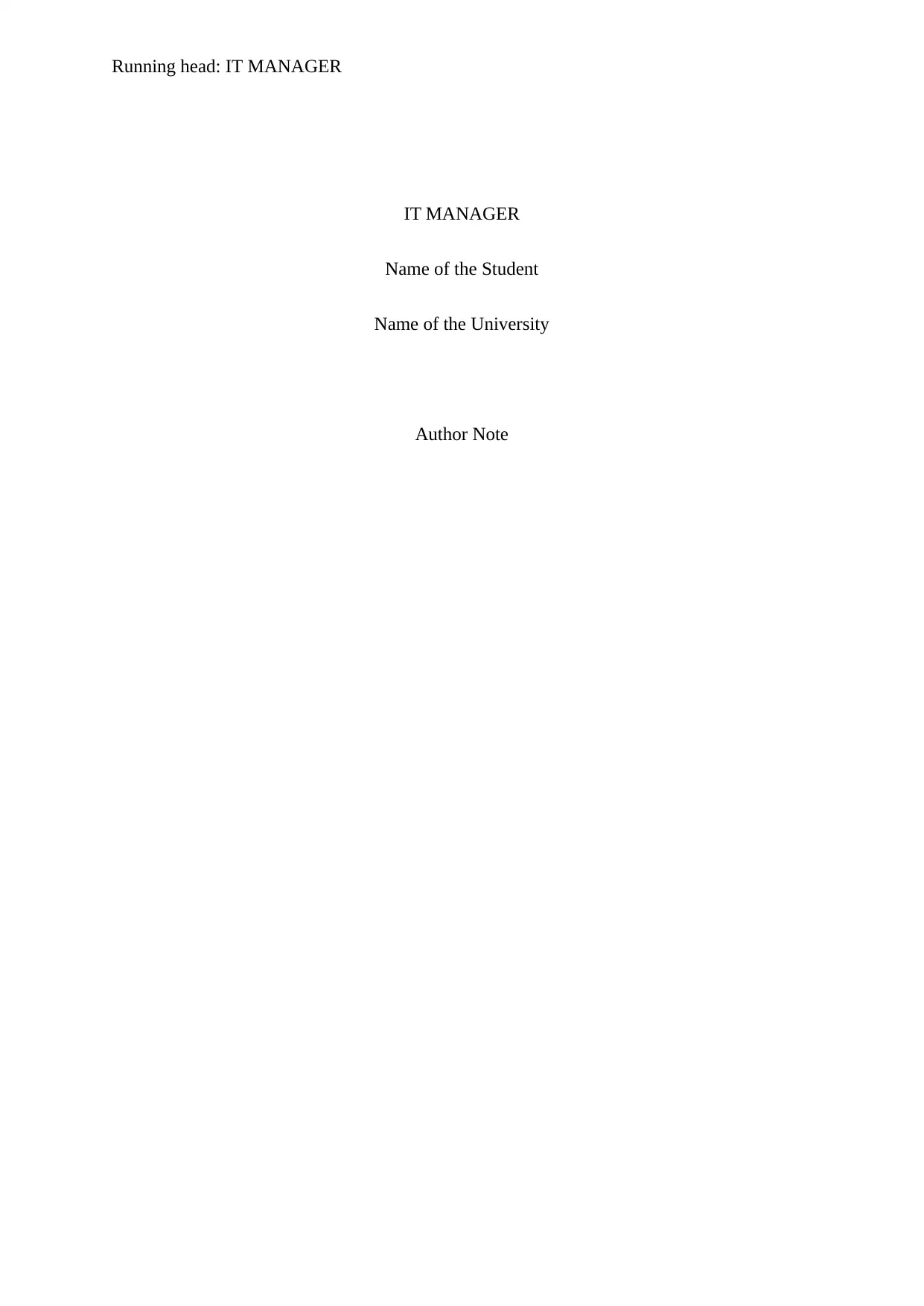
Running head: IT MANAGER
IT MANAGER
Name of the Student
Name of the University
Author Note
IT MANAGER
Name of the Student
Name of the University
Author Note
Paraphrase This Document
Need a fresh take? Get an instant paraphrase of this document with our AI Paraphraser
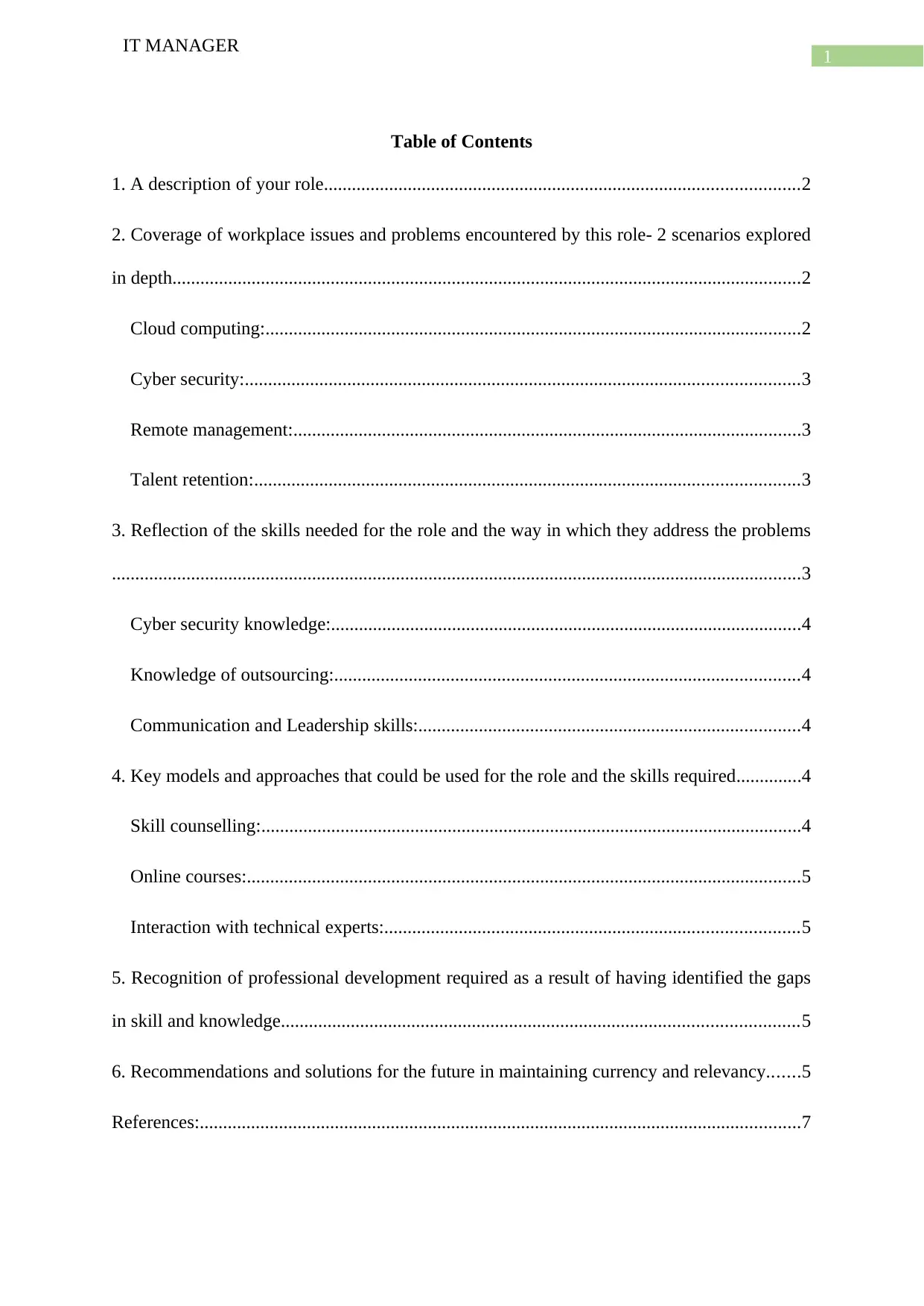
1
IT MANAGER
Table of Contents
1. A description of your role......................................................................................................2
2. Coverage of workplace issues and problems encountered by this role- 2 scenarios explored
in depth.......................................................................................................................................2
Cloud computing:...................................................................................................................2
Cyber security:.......................................................................................................................3
Remote management:.............................................................................................................3
Talent retention:.....................................................................................................................3
3. Reflection of the skills needed for the role and the way in which they address the problems
....................................................................................................................................................3
Cyber security knowledge:.....................................................................................................4
Knowledge of outsourcing:....................................................................................................4
Communication and Leadership skills:..................................................................................4
4. Key models and approaches that could be used for the role and the skills required..............4
Skill counselling:....................................................................................................................4
Online courses:.......................................................................................................................5
Interaction with technical experts:.........................................................................................5
5. Recognition of professional development required as a result of having identified the gaps
in skill and knowledge...............................................................................................................5
6. Recommendations and solutions for the future in maintaining currency and relevancy.......5
References:.................................................................................................................................7
IT MANAGER
Table of Contents
1. A description of your role......................................................................................................2
2. Coverage of workplace issues and problems encountered by this role- 2 scenarios explored
in depth.......................................................................................................................................2
Cloud computing:...................................................................................................................2
Cyber security:.......................................................................................................................3
Remote management:.............................................................................................................3
Talent retention:.....................................................................................................................3
3. Reflection of the skills needed for the role and the way in which they address the problems
....................................................................................................................................................3
Cyber security knowledge:.....................................................................................................4
Knowledge of outsourcing:....................................................................................................4
Communication and Leadership skills:..................................................................................4
4. Key models and approaches that could be used for the role and the skills required..............4
Skill counselling:....................................................................................................................4
Online courses:.......................................................................................................................5
Interaction with technical experts:.........................................................................................5
5. Recognition of professional development required as a result of having identified the gaps
in skill and knowledge...............................................................................................................5
6. Recommendations and solutions for the future in maintaining currency and relevancy.......5
References:.................................................................................................................................7
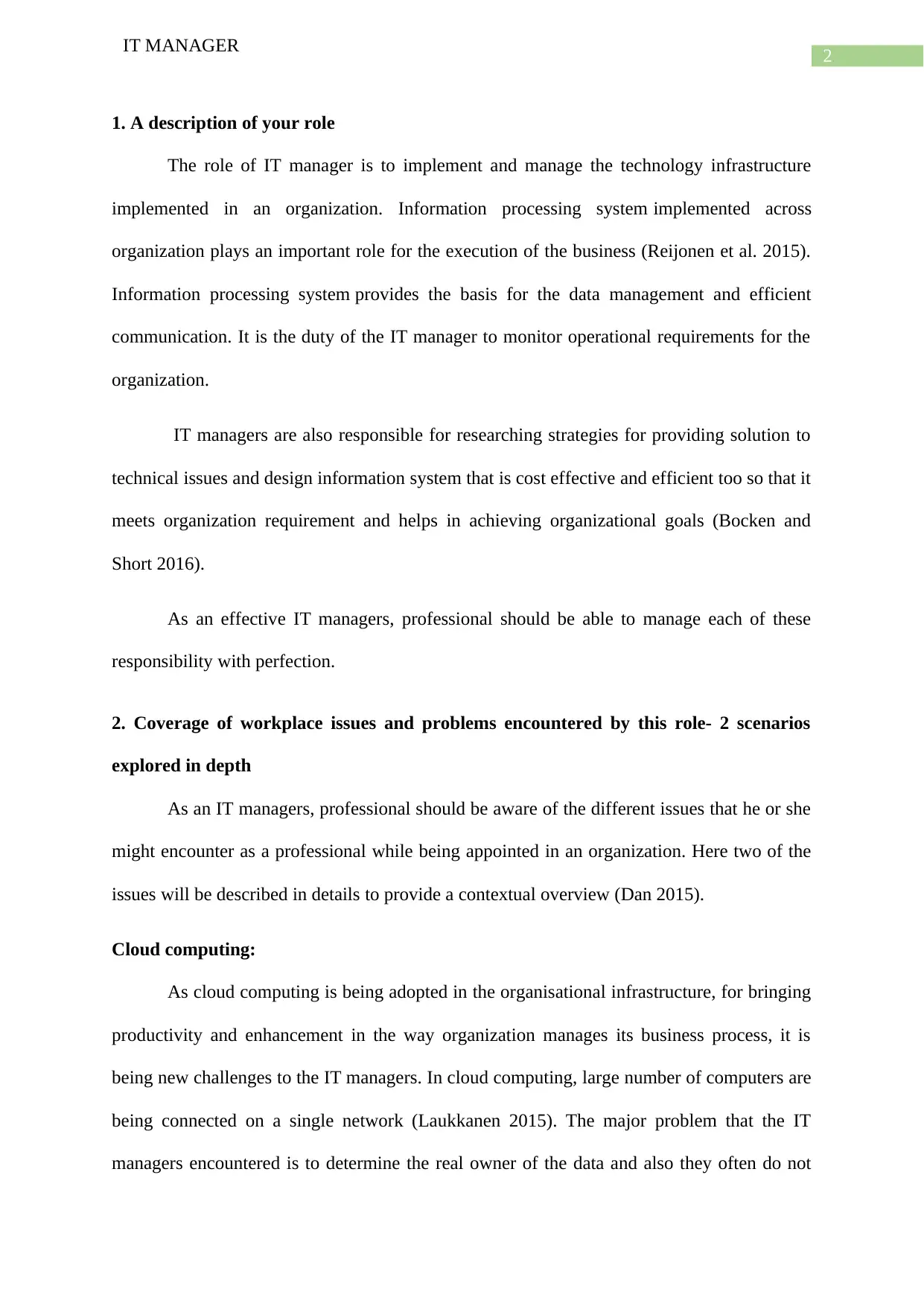
2
IT MANAGER
1. A description of your role
The role of IT manager is to implement and manage the technology infrastructure
implemented in an organization. Information processing system implemented across
organization plays an important role for the execution of the business (Reijonen et al. 2015).
Information processing system provides the basis for the data management and efficient
communication. It is the duty of the IT manager to monitor operational requirements for the
organization.
IT managers are also responsible for researching strategies for providing solution to
technical issues and design information system that is cost effective and efficient too so that it
meets organization requirement and helps in achieving organizational goals (Bocken and
Short 2016).
As an effective IT managers, professional should be able to manage each of these
responsibility with perfection.
2. Coverage of workplace issues and problems encountered by this role- 2 scenarios
explored in depth
As an IT managers, professional should be aware of the different issues that he or she
might encounter as a professional while being appointed in an organization. Here two of the
issues will be described in details to provide a contextual overview (Dan 2015).
Cloud computing:
As cloud computing is being adopted in the organisational infrastructure, for bringing
productivity and enhancement in the way organization manages its business process, it is
being new challenges to the IT managers. In cloud computing, large number of computers are
being connected on a single network (Laukkanen 2015). The major problem that the IT
managers encountered is to determine the real owner of the data and also they often do not
IT MANAGER
1. A description of your role
The role of IT manager is to implement and manage the technology infrastructure
implemented in an organization. Information processing system implemented across
organization plays an important role for the execution of the business (Reijonen et al. 2015).
Information processing system provides the basis for the data management and efficient
communication. It is the duty of the IT manager to monitor operational requirements for the
organization.
IT managers are also responsible for researching strategies for providing solution to
technical issues and design information system that is cost effective and efficient too so that it
meets organization requirement and helps in achieving organizational goals (Bocken and
Short 2016).
As an effective IT managers, professional should be able to manage each of these
responsibility with perfection.
2. Coverage of workplace issues and problems encountered by this role- 2 scenarios
explored in depth
As an IT managers, professional should be aware of the different issues that he or she
might encounter as a professional while being appointed in an organization. Here two of the
issues will be described in details to provide a contextual overview (Dan 2015).
Cloud computing:
As cloud computing is being adopted in the organisational infrastructure, for bringing
productivity and enhancement in the way organization manages its business process, it is
being new challenges to the IT managers. In cloud computing, large number of computers are
being connected on a single network (Laukkanen 2015). The major problem that the IT
managers encountered is to determine the real owner of the data and also they often do not
⊘ This is a preview!⊘
Do you want full access?
Subscribe today to unlock all pages.

Trusted by 1+ million students worldwide
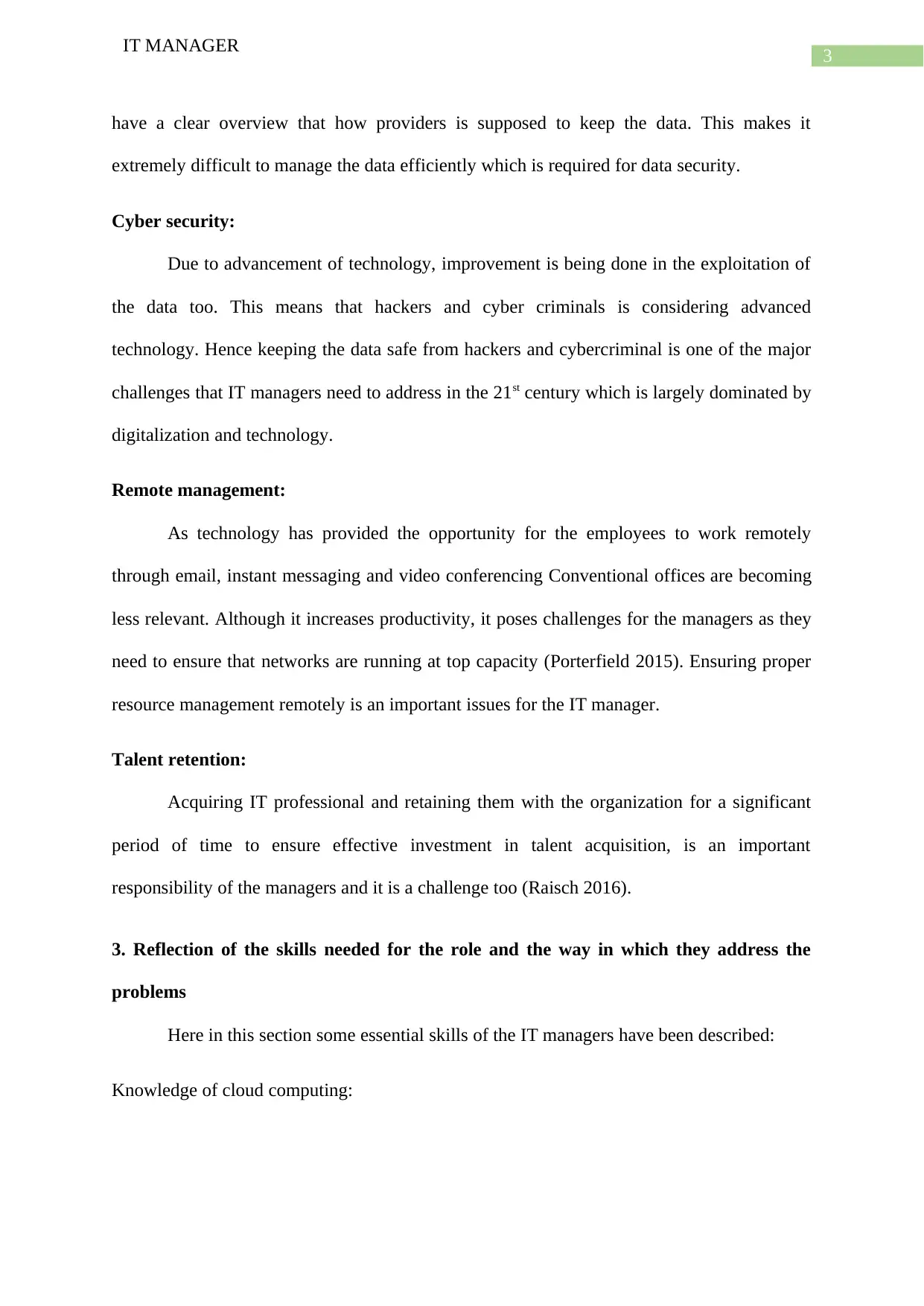
3
IT MANAGER
have a clear overview that how providers is supposed to keep the data. This makes it
extremely difficult to manage the data efficiently which is required for data security.
Cyber security:
Due to advancement of technology, improvement is being done in the exploitation of
the data too. This means that hackers and cyber criminals is considering advanced
technology. Hence keeping the data safe from hackers and cybercriminal is one of the major
challenges that IT managers need to address in the 21st century which is largely dominated by
digitalization and technology.
Remote management:
As technology has provided the opportunity for the employees to work remotely
through email, instant messaging and video conferencing Conventional offices are becoming
less relevant. Although it increases productivity, it poses challenges for the managers as they
need to ensure that networks are running at top capacity (Porterfield 2015). Ensuring proper
resource management remotely is an important issues for the IT manager.
Talent retention:
Acquiring IT professional and retaining them with the organization for a significant
period of time to ensure effective investment in talent acquisition, is an important
responsibility of the managers and it is a challenge too (Raisch 2016).
3. Reflection of the skills needed for the role and the way in which they address the
problems
Here in this section some essential skills of the IT managers have been described:
Knowledge of cloud computing:
IT MANAGER
have a clear overview that how providers is supposed to keep the data. This makes it
extremely difficult to manage the data efficiently which is required for data security.
Cyber security:
Due to advancement of technology, improvement is being done in the exploitation of
the data too. This means that hackers and cyber criminals is considering advanced
technology. Hence keeping the data safe from hackers and cybercriminal is one of the major
challenges that IT managers need to address in the 21st century which is largely dominated by
digitalization and technology.
Remote management:
As technology has provided the opportunity for the employees to work remotely
through email, instant messaging and video conferencing Conventional offices are becoming
less relevant. Although it increases productivity, it poses challenges for the managers as they
need to ensure that networks are running at top capacity (Porterfield 2015). Ensuring proper
resource management remotely is an important issues for the IT manager.
Talent retention:
Acquiring IT professional and retaining them with the organization for a significant
period of time to ensure effective investment in talent acquisition, is an important
responsibility of the managers and it is a challenge too (Raisch 2016).
3. Reflection of the skills needed for the role and the way in which they address the
problems
Here in this section some essential skills of the IT managers have been described:
Knowledge of cloud computing:
Paraphrase This Document
Need a fresh take? Get an instant paraphrase of this document with our AI Paraphraser
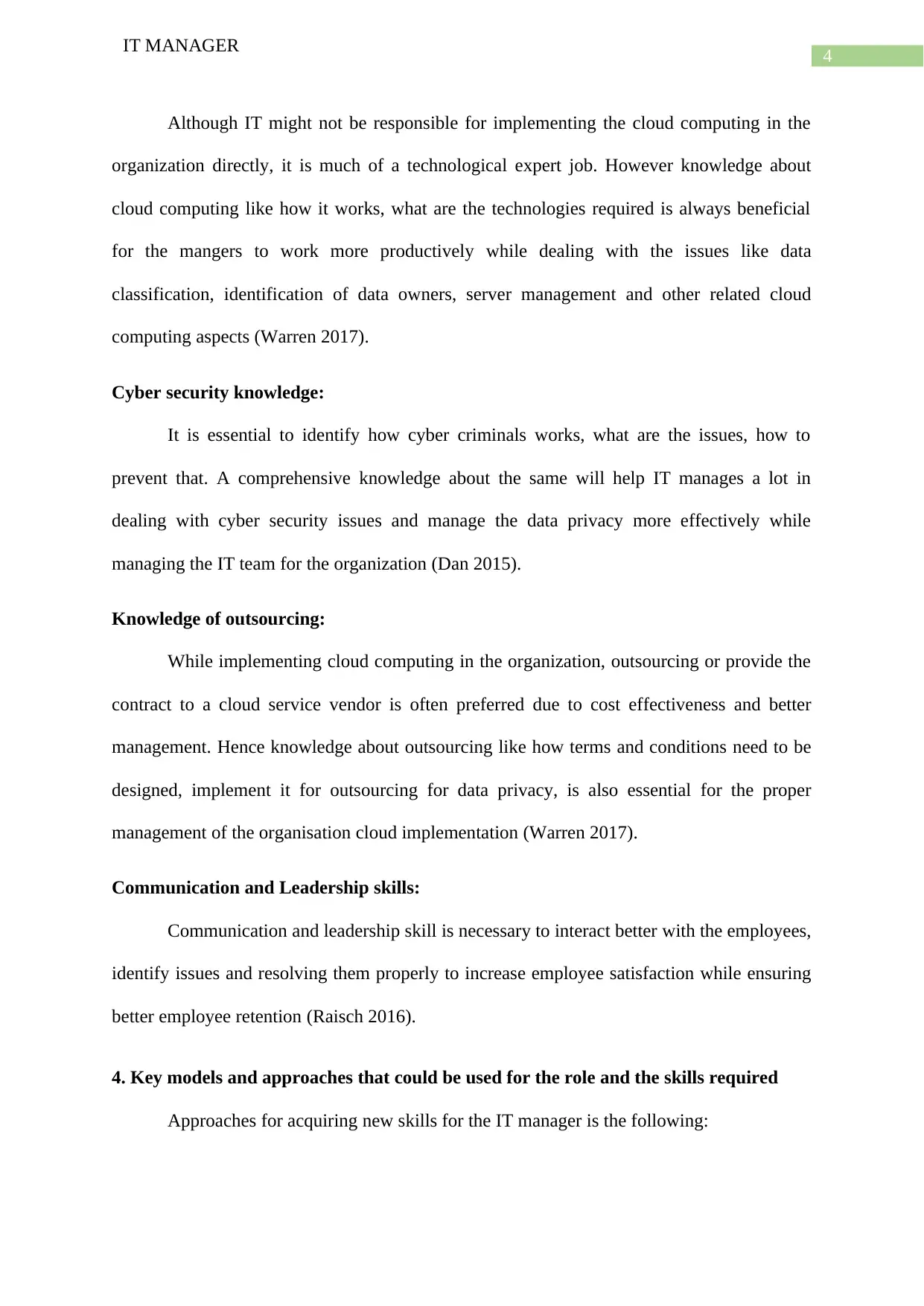
4
IT MANAGER
Although IT might not be responsible for implementing the cloud computing in the
organization directly, it is much of a technological expert job. However knowledge about
cloud computing like how it works, what are the technologies required is always beneficial
for the mangers to work more productively while dealing with the issues like data
classification, identification of data owners, server management and other related cloud
computing aspects (Warren 2017).
Cyber security knowledge:
It is essential to identify how cyber criminals works, what are the issues, how to
prevent that. A comprehensive knowledge about the same will help IT manages a lot in
dealing with cyber security issues and manage the data privacy more effectively while
managing the IT team for the organization (Dan 2015).
Knowledge of outsourcing:
While implementing cloud computing in the organization, outsourcing or provide the
contract to a cloud service vendor is often preferred due to cost effectiveness and better
management. Hence knowledge about outsourcing like how terms and conditions need to be
designed, implement it for outsourcing for data privacy, is also essential for the proper
management of the organisation cloud implementation (Warren 2017).
Communication and Leadership skills:
Communication and leadership skill is necessary to interact better with the employees,
identify issues and resolving them properly to increase employee satisfaction while ensuring
better employee retention (Raisch 2016).
4. Key models and approaches that could be used for the role and the skills required
Approaches for acquiring new skills for the IT manager is the following:
IT MANAGER
Although IT might not be responsible for implementing the cloud computing in the
organization directly, it is much of a technological expert job. However knowledge about
cloud computing like how it works, what are the technologies required is always beneficial
for the mangers to work more productively while dealing with the issues like data
classification, identification of data owners, server management and other related cloud
computing aspects (Warren 2017).
Cyber security knowledge:
It is essential to identify how cyber criminals works, what are the issues, how to
prevent that. A comprehensive knowledge about the same will help IT manages a lot in
dealing with cyber security issues and manage the data privacy more effectively while
managing the IT team for the organization (Dan 2015).
Knowledge of outsourcing:
While implementing cloud computing in the organization, outsourcing or provide the
contract to a cloud service vendor is often preferred due to cost effectiveness and better
management. Hence knowledge about outsourcing like how terms and conditions need to be
designed, implement it for outsourcing for data privacy, is also essential for the proper
management of the organisation cloud implementation (Warren 2017).
Communication and Leadership skills:
Communication and leadership skill is necessary to interact better with the employees,
identify issues and resolving them properly to increase employee satisfaction while ensuring
better employee retention (Raisch 2016).
4. Key models and approaches that could be used for the role and the skills required
Approaches for acquiring new skills for the IT manager is the following:
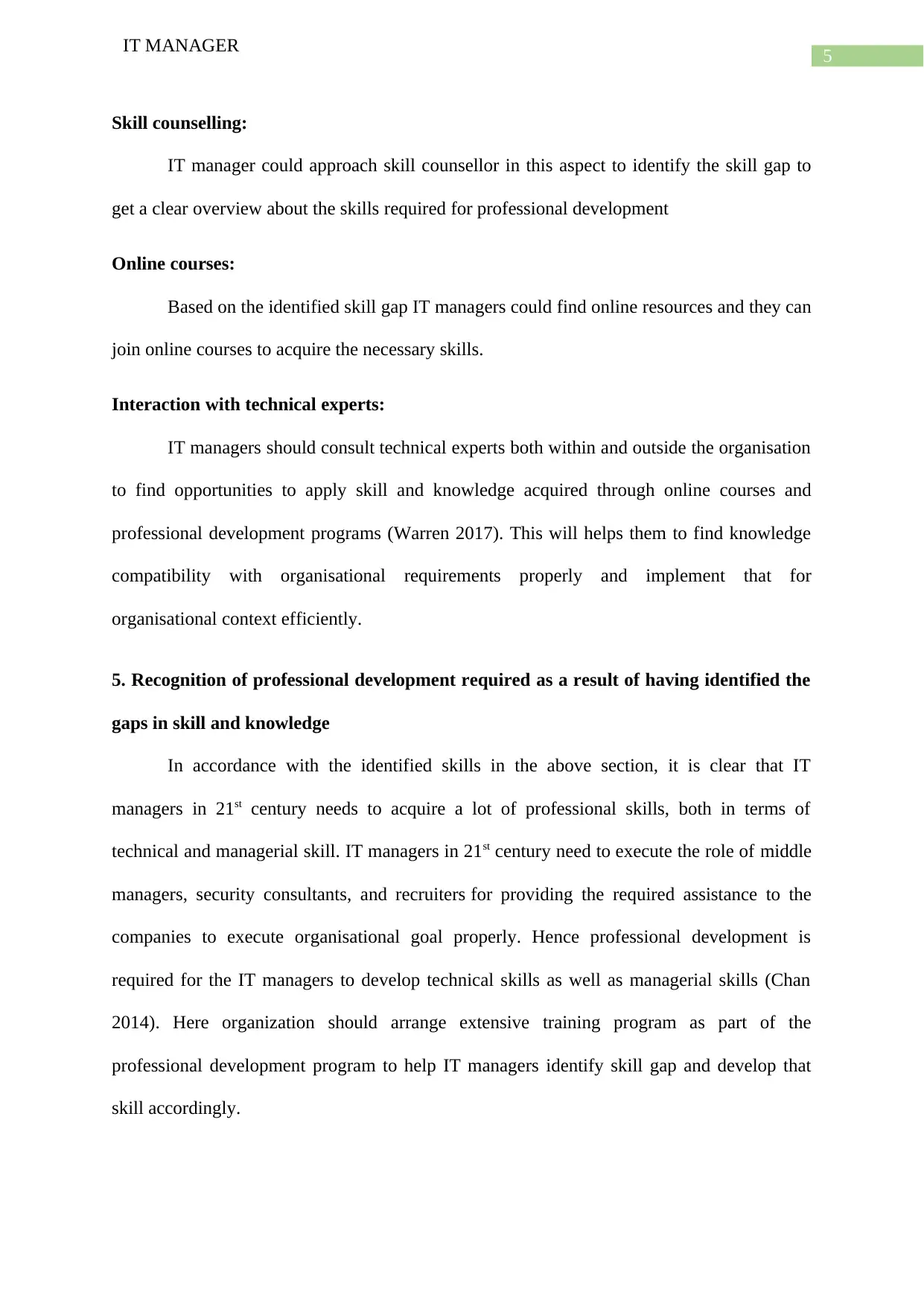
5
IT MANAGER
Skill counselling:
IT manager could approach skill counsellor in this aspect to identify the skill gap to
get a clear overview about the skills required for professional development
Online courses:
Based on the identified skill gap IT managers could find online resources and they can
join online courses to acquire the necessary skills.
Interaction with technical experts:
IT managers should consult technical experts both within and outside the organisation
to find opportunities to apply skill and knowledge acquired through online courses and
professional development programs (Warren 2017). This will helps them to find knowledge
compatibility with organisational requirements properly and implement that for
organisational context efficiently.
5. Recognition of professional development required as a result of having identified the
gaps in skill and knowledge
In accordance with the identified skills in the above section, it is clear that IT
managers in 21st century needs to acquire a lot of professional skills, both in terms of
technical and managerial skill. IT managers in 21st century need to execute the role of middle
managers, security consultants, and recruiters for providing the required assistance to the
companies to execute organisational goal properly. Hence professional development is
required for the IT managers to develop technical skills as well as managerial skills (Chan
2014). Here organization should arrange extensive training program as part of the
professional development program to help IT managers identify skill gap and develop that
skill accordingly.
IT MANAGER
Skill counselling:
IT manager could approach skill counsellor in this aspect to identify the skill gap to
get a clear overview about the skills required for professional development
Online courses:
Based on the identified skill gap IT managers could find online resources and they can
join online courses to acquire the necessary skills.
Interaction with technical experts:
IT managers should consult technical experts both within and outside the organisation
to find opportunities to apply skill and knowledge acquired through online courses and
professional development programs (Warren 2017). This will helps them to find knowledge
compatibility with organisational requirements properly and implement that for
organisational context efficiently.
5. Recognition of professional development required as a result of having identified the
gaps in skill and knowledge
In accordance with the identified skills in the above section, it is clear that IT
managers in 21st century needs to acquire a lot of professional skills, both in terms of
technical and managerial skill. IT managers in 21st century need to execute the role of middle
managers, security consultants, and recruiters for providing the required assistance to the
companies to execute organisational goal properly. Hence professional development is
required for the IT managers to develop technical skills as well as managerial skills (Chan
2014). Here organization should arrange extensive training program as part of the
professional development program to help IT managers identify skill gap and develop that
skill accordingly.
⊘ This is a preview!⊘
Do you want full access?
Subscribe today to unlock all pages.

Trusted by 1+ million students worldwide
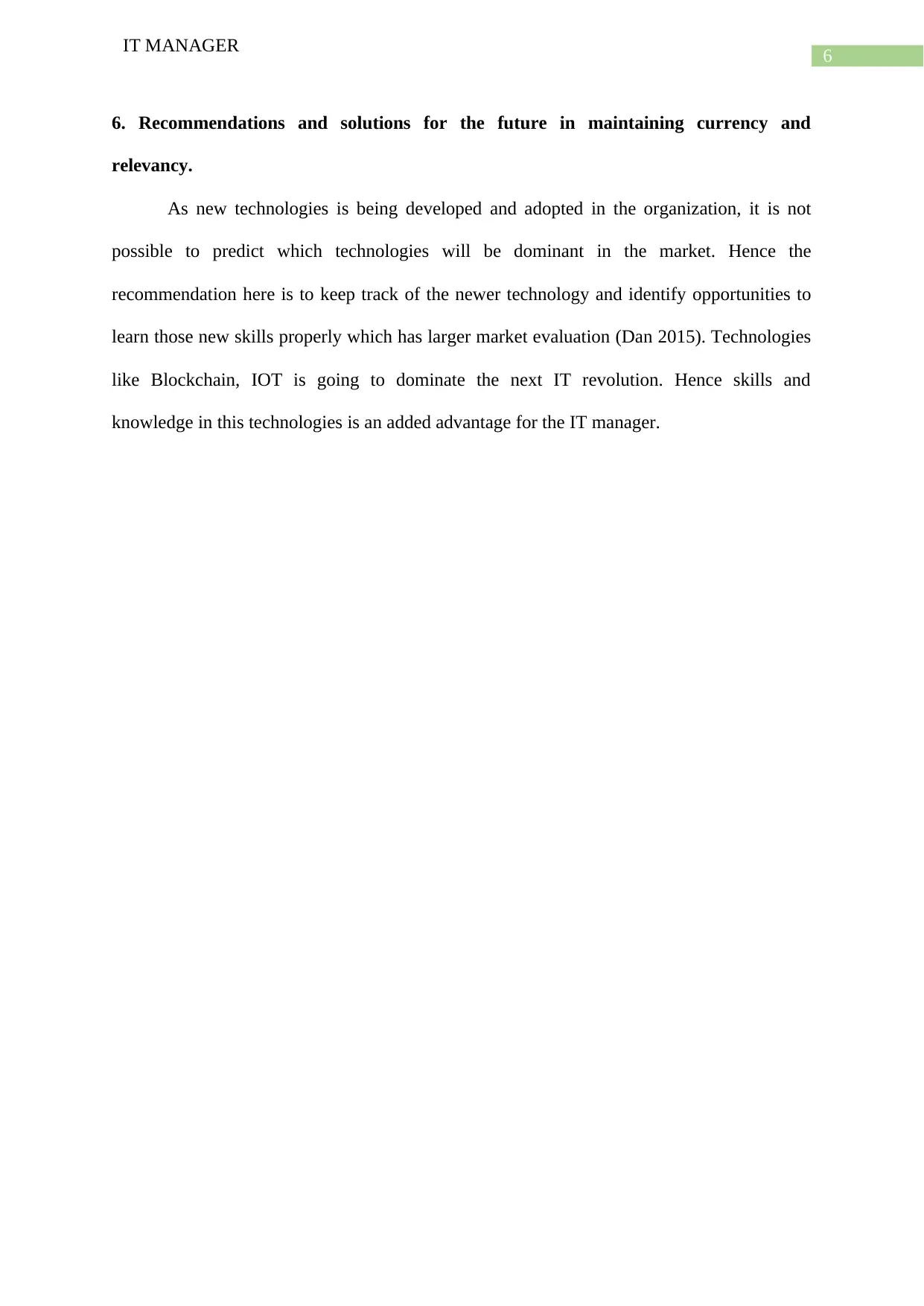
6
IT MANAGER
6. Recommendations and solutions for the future in maintaining currency and
relevancy.
As new technologies is being developed and adopted in the organization, it is not
possible to predict which technologies will be dominant in the market. Hence the
recommendation here is to keep track of the newer technology and identify opportunities to
learn those new skills properly which has larger market evaluation (Dan 2015). Technologies
like Blockchain, IOT is going to dominate the next IT revolution. Hence skills and
knowledge in this technologies is an added advantage for the IT manager.
IT MANAGER
6. Recommendations and solutions for the future in maintaining currency and
relevancy.
As new technologies is being developed and adopted in the organization, it is not
possible to predict which technologies will be dominant in the market. Hence the
recommendation here is to keep track of the newer technology and identify opportunities to
learn those new skills properly which has larger market evaluation (Dan 2015). Technologies
like Blockchain, IOT is going to dominate the next IT revolution. Hence skills and
knowledge in this technologies is an added advantage for the IT manager.
Paraphrase This Document
Need a fresh take? Get an instant paraphrase of this document with our AI Paraphraser
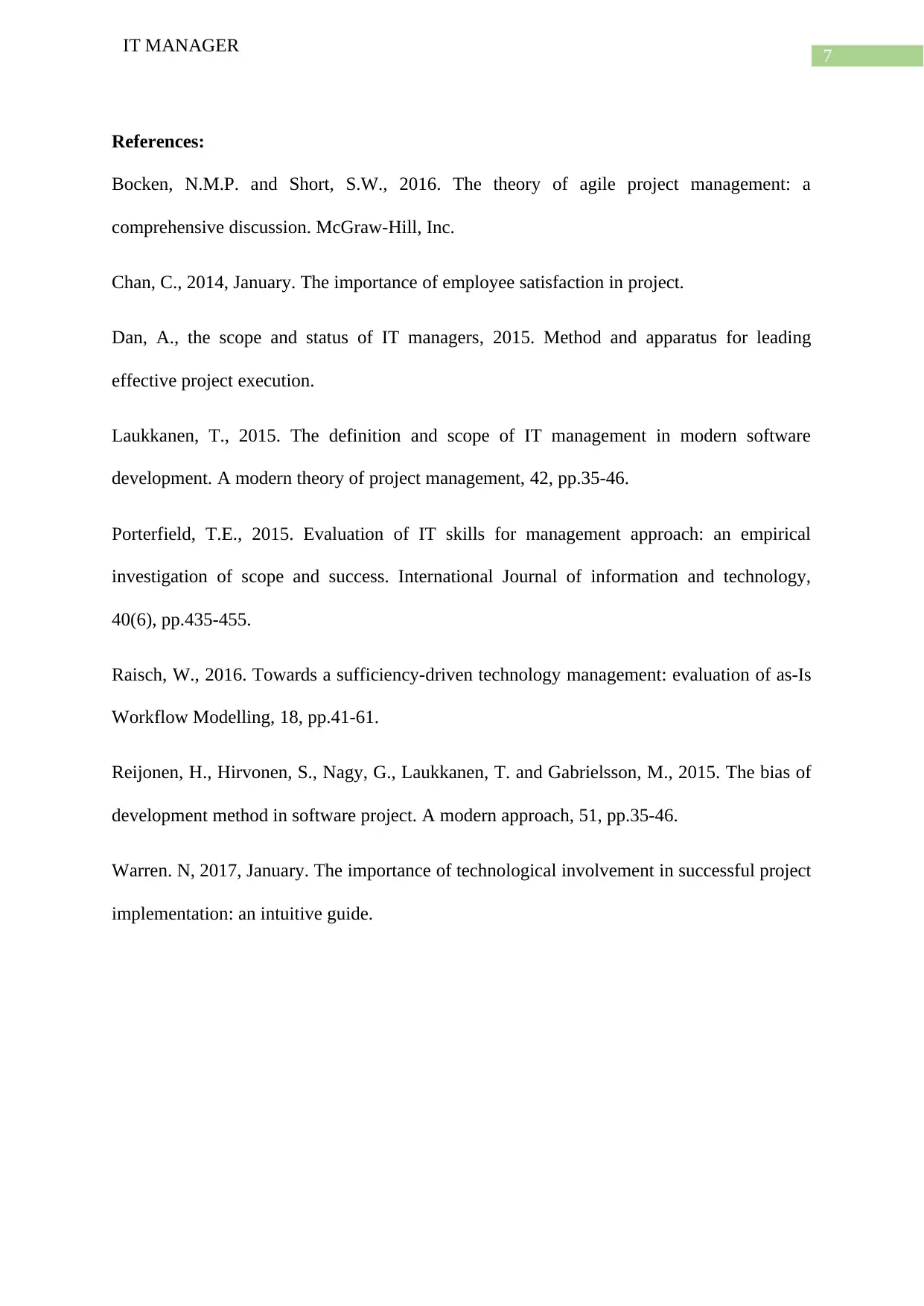
7
IT MANAGER
References:
Bocken, N.M.P. and Short, S.W., 2016. The theory of agile project management: a
comprehensive discussion. McGraw-Hill, Inc.
Chan, C., 2014, January. The importance of employee satisfaction in project.
Dan, A., the scope and status of IT managers, 2015. Method and apparatus for leading
effective project execution.
Laukkanen, T., 2015. The definition and scope of IT management in modern software
development. A modern theory of project management, 42, pp.35-46.
Porterfield, T.E., 2015. Evaluation of IT skills for management approach: an empirical
investigation of scope and success. International Journal of information and technology,
40(6), pp.435-455.
Raisch, W., 2016. Towards a sufficiency-driven technology management: evaluation of as-Is
Workflow Modelling, 18, pp.41-61.
Reijonen, H., Hirvonen, S., Nagy, G., Laukkanen, T. and Gabrielsson, M., 2015. The bias of
development method in software project. A modern approach, 51, pp.35-46.
Warren. N, 2017, January. The importance of technological involvement in successful project
implementation: an intuitive guide.
IT MANAGER
References:
Bocken, N.M.P. and Short, S.W., 2016. The theory of agile project management: a
comprehensive discussion. McGraw-Hill, Inc.
Chan, C., 2014, January. The importance of employee satisfaction in project.
Dan, A., the scope and status of IT managers, 2015. Method and apparatus for leading
effective project execution.
Laukkanen, T., 2015. The definition and scope of IT management in modern software
development. A modern theory of project management, 42, pp.35-46.
Porterfield, T.E., 2015. Evaluation of IT skills for management approach: an empirical
investigation of scope and success. International Journal of information and technology,
40(6), pp.435-455.
Raisch, W., 2016. Towards a sufficiency-driven technology management: evaluation of as-Is
Workflow Modelling, 18, pp.41-61.
Reijonen, H., Hirvonen, S., Nagy, G., Laukkanen, T. and Gabrielsson, M., 2015. The bias of
development method in software project. A modern approach, 51, pp.35-46.
Warren. N, 2017, January. The importance of technological involvement in successful project
implementation: an intuitive guide.
1 out of 8
Related Documents
Your All-in-One AI-Powered Toolkit for Academic Success.
+13062052269
info@desklib.com
Available 24*7 on WhatsApp / Email
![[object Object]](/_next/static/media/star-bottom.7253800d.svg)
Unlock your academic potential
Copyright © 2020–2026 A2Z Services. All Rights Reserved. Developed and managed by ZUCOL.





